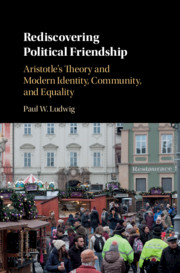Book contents
- Rediscovering Political Friendship
- Rediscovering Political Friendship
- Copyright page
- Dedication
- Epigraph
- Contents
- Preface and Acknowledgments
- Introduction
- Part I Foundations of Friendship
- Part II Where Is Civic Friendship Today?
- Part III A Different Way to View Liberalism
- Part IV Conclusion
- Works Cited
- Index
Introduction
Published online by Cambridge University Press: 12 December 2019
- Rediscovering Political Friendship
- Rediscovering Political Friendship
- Copyright page
- Dedication
- Epigraph
- Contents
- Preface and Acknowledgments
- Introduction
- Part I Foundations of Friendship
- Part II Where Is Civic Friendship Today?
- Part III A Different Way to View Liberalism
- Part IV Conclusion
- Works Cited
- Index
Summary
Modern neglect of civic friendship stems from abstract ideals: cosmopolitanism makes it seem narrow and belligerent; capitalism prefers utility purified of friendly feelings. Yet friendly feelings persist: in debates over out-sourcing jobs, Americans value Americans more highly than foreigners; in commercial exchanges, to ignore friendly feelings would violate the first rule of salesmanship. According to Aristotle, feelings grow up around shared utilities such as trade relations, common defense, and the regime, each producing an imperfect friendship by contrast with the perfect friendship based on virtuous character. Liberal democracies have many features of his civic friendship—reciprocity in exchange, agreement about the regime, small associations, private benefactors, and a large middle class to promote equality—without attributing them to Aristotle’s theory. Civic friendship is at work in liberal societies, but our models fail to capture its effects. Besides its normative benefits, studying civic friendship would improve liberal theory’s descriptive accuracy. Instead of exhorting citizens to be friendlier, theorists should empirically study the existing civic friendship.
Keywords
- Type
- Chapter
- Information
- Rediscovering Political FriendshipAristotle's Theory and Modern Identity, Community, and Equality, pp. 1 - 22Publisher: Cambridge University PressPrint publication year: 2020

